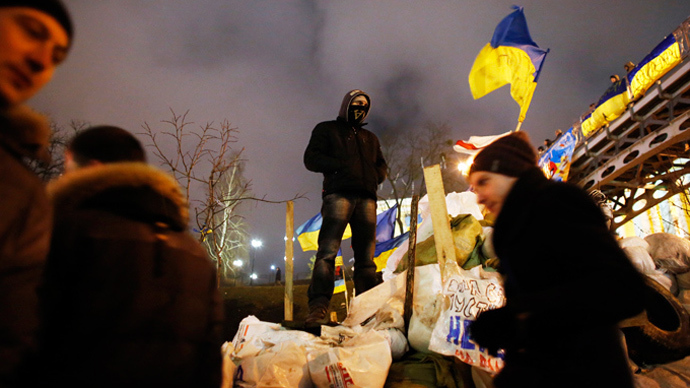'Stalemate over Ukraine an extension of East-West diplomatic tussle over Syria'

The tug of war over Ukraine is an extension of the diplomatic spat over Syria, where EU and US plans were thwarted diplomatically by Russia. Now the West is taking the fight to Moscow’s doorstep, geopolitical analyst Patrick Henningsen told RT.
While the pro-EU and anti-governmental protests in Ukraine continue, the country’s leadership finds itself on very shaky ground. On the one hand, the European Union has announced it is freezing its work with the Ukrainian government on a controversial trade agreement, which the country decided to postpone last month, triggering the protests. An American delegation came to the country and supported the protestors, with Senator John McCain claiming the US would consider sanctions if there is any further violence against peaceful protesters. On the other hand, the visit of Ukrainian President Yanukovich to Russia resulted in signing a number of deals aimed at supporting the Ukrainian economy. Among them is the deal that allows Ukraine to start buying Russian gas for $268, instead of $400 per 1,000 cubic meters, from January 2014.
The whole situation is “an extension of what happened in Syria only a few months ago, whereby European and US designs in Syria were usurped diplomatically by a Russian solution,” Henningsen told RT.
“Now they are taking the fight really intensely to Russia on its doorstep,” he said.
“Imagine if Russia went over to Mexico and threatened sanctions against the Mexicans if they entered into any trade agreement with the US, like NAFTA. How ridiculous is this? But this shows you the sort of rich scope of this outside intervention. They want to fold Ukraine into Europe.”
Aiming to involve Ukraine into its orbit, the EU has also promised to give it $17 billion to narrow its financial shortfall. However, given the severe economic difficulties inside the EU, it is very unlikely that Europe has enough resources to incorporate yet another country with a struggling economy.
“If Ukraine goes to the EU, then you have issues of arms sales and other programs, like finance programs via bank loans, and potentially you could turn this economy over in about five years. It’s a very risky prospect for the future of Ukraine,” Henningsen said.
Henningsen pointed out that Ukraine is a ground for the battle of currencies, too, with the undervalued ruble and the overvalued euro.
“Given the influence of the euro, if the IMF decides to maybe have an international currency reset, Ukraine is going to be a massive battleground at Russia’s doorstep because Ukraine is a bread basket in terms of wheat and grains – it’s one of the bread baskets of the world. And that could be privatized, could be leveraged, so you have a lot of issues there. Folding Ukraine into Europe clearly would be an economic disaster for any fledging economy. Clearly it’s an engineered move to pull Ukraine to the EU and to antagonize Russia.”
There may be a political benefit of joining the EU for some people, Henningsen said. Among them are those who can use this issue “to leverage power to get into power, which is clearly what the opposition is doing.”
Henningsen said there are also “people who want to join the EU: the middle class university-educated people, politically active people in Ukraine.”
He added: “They see this as a ticket into Europe to go emigrate there or to go to study there, to get out of Ukraine. That is just a small part of a mosaic of what makes up this kind of artificial issue with joining the EU. And this is also about NATO.”
The statements, views and opinions expressed in this column are solely those of the author and do not necessarily represent those of RT.
The statements, views and opinions expressed in this column are solely those of the author and do not necessarily represent those of RT.













